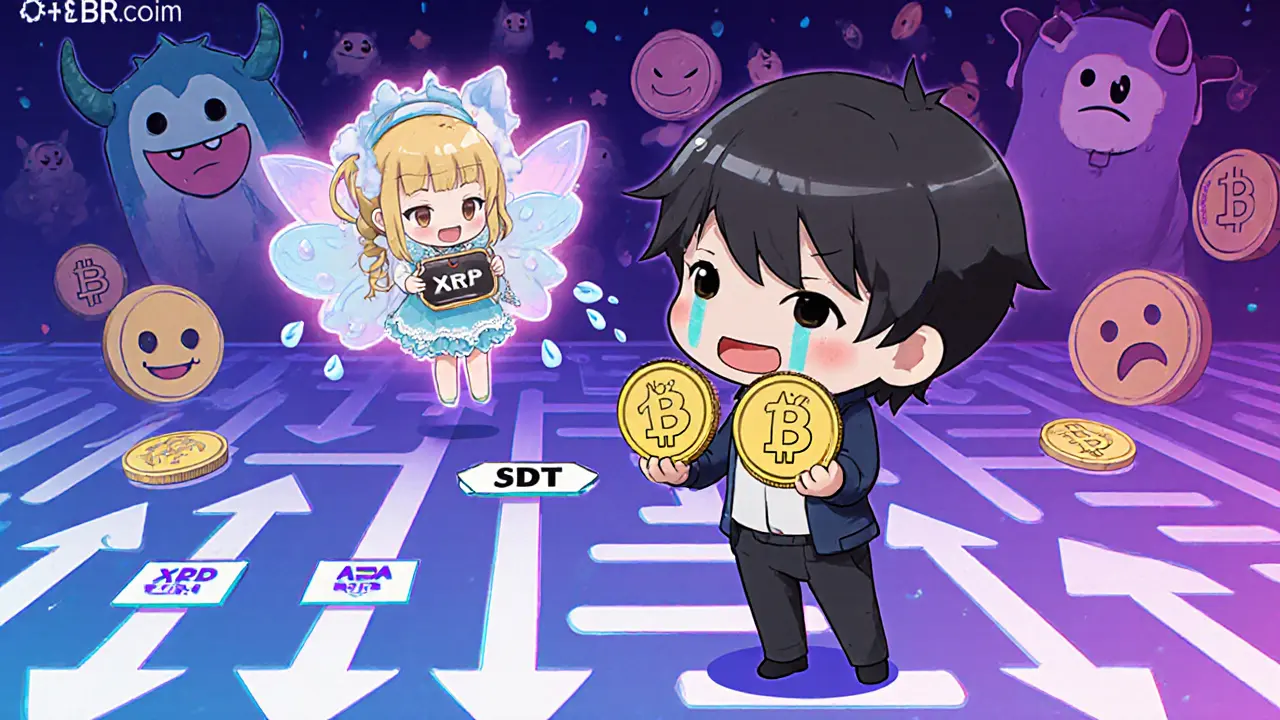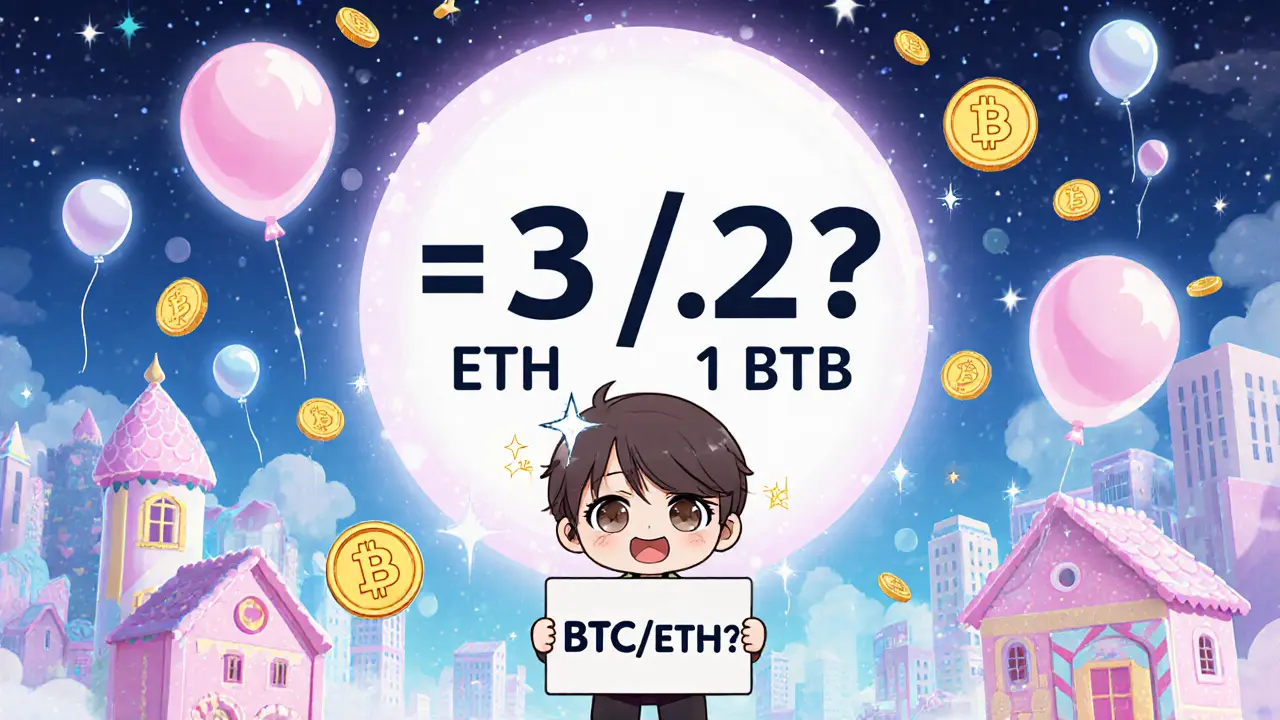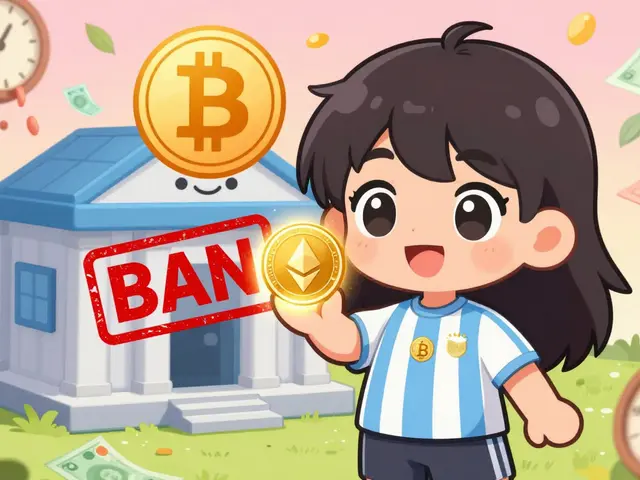Trading Pair Converter Calculator
Understand how trading pairs work by converting between currencies. Enter an amount and see the equivalent value based on real-time exchange rates.
Equivalent Amount:
Example: For BTC/ETH at 3.2, enter 1 BTC to get 3.2 ETH.
When you first open a crypto exchange, you see a long list of names like BTC/ETH, ETH/USDT, or SOL/BTC. These aren’t random codes-they’re trading pairs, and they’re the foundation of every crypto trade you’ll ever make. If you don’t understand them, you’re basically guessing at prices without a map. Let’s break it down so you know exactly what you’re looking at-and how to use it to your advantage.
What Exactly Is a Trading Pair?
A trading pair is simply two cryptocurrencies-or a cryptocurrency and a fiat currency-that you can trade against each other. Think of it like exchanging one currency for another when you travel. If you’re in Australia and want euros, you don’t pay in Australian dollars directly to get euros-you go to a currency exchange and see the rate: 1 AUD = 0.61 EUR. Same thing in crypto. Instead of AUD and EUR, you’ve got BTC and ETH. The pair BTC/ETH tells you how much Ethereum you get for one Bitcoin.The format is always the same: base currency / quote currency. In BTC/ETH, Bitcoin is the base currency. That’s the asset you’re buying or selling. Ethereum is the quote currency-that’s what you’re using to pay for it. If BTC/ETH is trading at 3.2, it means one Bitcoin costs 3.2 Ethereum. If you sell one BTC, you get 3.2 ETH back. Simple.
Why Do Trading Pairs Even Exist?
Not every crypto can be bought directly with cash. You can’t just walk into an exchange and buy Solana with Australian dollars on every platform. Most exchanges only let you trade crypto against crypto-or crypto against stablecoins like USDT or USDC. That’s where trading pairs come in. They’re the bridge between assets.Let’s say you have XRP and you want to buy Cardano. If there’s no XRP/ADA pair, you can’t trade directly. Instead, you’d need to first trade your XRP for BTC, then trade BTC for ADA. That’s two trades, two fees, and two chances for price movement to hurt you. That’s why liquidity matters. Pairs like BTC/USDT or ETH/USDT are popular because they’re liquid-lots of people trade them, so prices stay stable and you don’t get stuck waiting for a buyer or seller.
Types of Trading Pairs You’ll Actually Use
Not all pairs are created equal. Here are the three main types you’ll run into:- Major Crypto Pairs - These are the big names trading against each other. BTC/ETH, ETH/LTC, SOL/BTC. These are popular because they’re highly liquid, meaning prices move smoothly and you can buy or sell quickly without big price swings.
- Crypto-to-Fiat Pairs - These let you trade crypto directly for real money. BTC/AUD, ETH/EUR, SOL/USD. These are great if you’re starting out and want to cash out without going through another crypto first. But not every exchange offers them-especially outside the US or EU.
- Stablecoin Pairs - These are the most common for active traders. BTC/USDT, ETH/USDC, ADA/USDT. Stablecoins like USDT are pegged to the US dollar, so their value doesn’t swing wildly. That makes them the go-to for trading because they’re stable, fast, and widely accepted.
For beginners, stick to stablecoin pairs. They’re easier to read, less risky, and you’ll find better prices. If you’re trying to buy your first Bitcoin, look for BTC/USDT-not some obscure pair like BTC/DOGE. The volume is higher, the spreads are tighter, and you won’t get ripped off by slippage.

How to Read a Trading Pair Price
The price you see next to a pair like BTC/ETH isn’t the value of Bitcoin in dollars-it’s how many ETH you get for one BTC. If the price is 3.15, you need 3.15 ETH to buy one BTC. If it drops to 3.00, Bitcoin just got cheaper in terms of Ethereum. That doesn’t mean Bitcoin lost value in USD-it just means Ethereum got stronger compared to Bitcoin.This is where people get confused. A price change in a trading pair doesn’t always mean the asset is going up or down in absolute terms. It’s relative. That’s why you need to check multiple pairs. If BTC/USDT is rising but BTC/ETH is falling, Bitcoin might be gaining against the dollar but losing against Ethereum. That tells you something about market sentiment, not just price.
Why Liquidity and Volume Matter
A pair with low volume is like a deserted street corner. You might find someone to trade with-but it’ll take time, and they might offer you a bad rate. High-volume pairs like BTC/USDT or ETH/USDT are like a busy mall. Thousands of people are trading every second. That means:- Prices stay tight-no wild jumps between buy and sell
- You can enter and exit fast
- Fees are lower because exchanges reward liquidity
- Slippage is minimal-you get the price you see
On the flip side, if you try to trade a rare pair like XMR/NEO, you might see a price of 0.0023. But when you try to buy, you end up getting 0.0020 because there’s no one selling at that price. That’s slippage. It eats into profits. Avoid low-volume pairs unless you’re doing deep research or trying to catch a rare opportunity.

How Trading Pairs Affect Your Strategy
Your choice of trading pair shapes your whole approach. If you’re a day trader, you want pairs with high volatility and volume-like SOL/USDT or AVAX/USDT. You’re betting on quick moves. If you’re holding long-term, you might prefer BTC/USDT because it’s stable and you know exactly what you’re buying.Some traders use arbitrage-buying an asset on one exchange where it’s cheap and selling it on another where it’s expensive. But that only works if the same pair exists on both platforms. If Exchange A has BTC/USDT but Exchange B only has BTC/ETH, you can’t do a direct arbitrage. You’d need to convert ETH to USDT first, adding steps and risk.
That’s why experienced traders keep an eye on pair availability across exchanges. If you’re serious about trading, you don’t just pick an exchange-you pick the right pairs on that exchange.
Common Mistakes New Traders Make
Most beginners mess up trading pairs in three ways:- Confusing base and quote - They think BTC/ETH means “how much BTC you get for ETH.” No. It’s the opposite. Always remember: how much quote currency for one base currency.
- Trading obscure pairs - They chase low-volume coins thinking they’ll explode. More often, they get stuck with an asset they can’t sell.
- Ignoring fees - Some exchanges charge extra for trading certain pairs. Always check the fee schedule. A 0.1% fee on BTC/USDT might be fine, but a 0.5% fee on a low-volume pair isn’t worth it.
Also, don’t assume the pair name tells you everything. ETH/BTC is not the same as BTC/ETH. The price is inverted. If BTC/ETH is 3.2, then ETH/BTC is 0.3125. Always check the order.
What to Do Next
Start simple. Pick one exchange that supports AUD deposits-like Independent Reserve or CoinSpot. Find the BTC/USDT pair. Watch it for a few days. Notice how the price moves. See how volume changes during market hours. Try a small trade. Buy $10 worth of BTC with USDT. Then sell it. See how the price changed. Notice the fee. That’s your first real lesson in trading pairs.Once you’re comfortable, try ETH/USDT. Then look at a pair like SOL/USDT. Compare how volatile it is. See how the spreads differ. You’ll start to understand why some pairs are better for trading and others are better for holding.
Trading pairs aren’t complicated. They’re just a way to measure value between two assets. But if you don’t learn how to read them, you’re flying blind. Master this one thing, and you’ve unlocked the core of crypto trading.
What does BTC/ETH mean in trading?
BTC/ETH means you’re trading Bitcoin (BTC) for Ethereum (ETH). The first currency, BTC, is the base-what you’re buying or selling. The second, ETH, is the quote-what you’re paying with. If the price is 3.5, you need 3.5 ETH to buy 1 BTC.
Can I trade crypto without using trading pairs?
No. Every trade on a crypto exchange uses a trading pair. Even if you’re buying Bitcoin with Australian dollars, that’s a trading pair: BTC/AUD. There’s no direct way to own crypto without exchanging it for another asset first.
Why are stablecoin pairs like BTC/USDT better for beginners?
Stablecoins like USDT are pegged to the US dollar, so their value doesn’t swing like Bitcoin or Ethereum. That means when you trade BTC/USDT, you’re seeing Bitcoin’s price in stable, predictable terms. It’s easier to track, less risky, and you avoid compounding volatility from trading one crypto against another.
What’s the difference between BTC/ETH and ETH/BTC?
They’re the same two assets, but the base and quote are flipped. BTC/ETH tells you how much ETH you get for one BTC. ETH/BTC tells you how much BTC you get for one ETH. If BTC/ETH is 3.2, then ETH/BTC is 1 ÷ 3.2 = 0.3125. Always check which one you’re looking at.
Do all exchanges offer the same trading pairs?
No. Larger exchanges like Binance or Coinbase offer hundreds of pairs. Smaller ones might only have BTC, ETH, and USDT pairs. Some exchanges don’t even support fiat pairs. Always check what pairs are available before you sign up-especially if you want to trade a specific coin.







Derayne Stegall
November 16, 2025 AT 05:34Shanell Nelly
November 17, 2025 AT 09:53Ryan Hansen
November 18, 2025 AT 11:49Aayansh Singh
November 18, 2025 AT 19:56Rebecca Amy
November 20, 2025 AT 00:22Darren Jones
November 21, 2025 AT 09:59Kathleen Bauer
November 23, 2025 AT 04:09Carol Rice
November 24, 2025 AT 07:09Laura Lauwereins
November 26, 2025 AT 04:23Gaurang Kulkarni
November 26, 2025 AT 12:19Nidhi Gaur
November 28, 2025 AT 04:17Usnish Guha
November 29, 2025 AT 18:16satish gedam
November 30, 2025 AT 06:57rahul saha
November 30, 2025 AT 15:41Marcia Birgen
November 30, 2025 AT 20:23Jerrad Kyle
December 1, 2025 AT 07:40Usama Ahmad
December 1, 2025 AT 17:25Nathan Ross
December 2, 2025 AT 20:55garrett goggin
December 3, 2025 AT 00:32Bill Henry
December 3, 2025 AT 02:36Astor Digital
December 4, 2025 AT 07:57